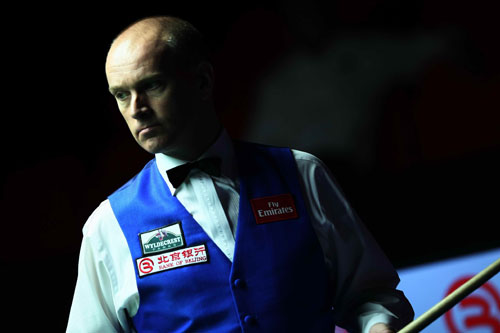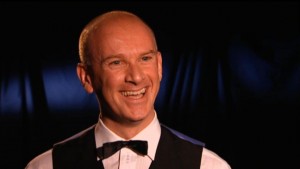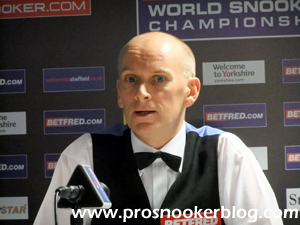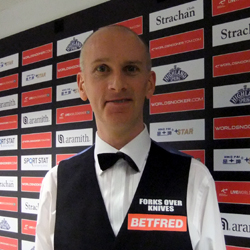 Name: Peter Ebdon
Name: Peter Ebdon
DOB: August 27th 1970
Nationality: England
Turned Pro: 1991
Highest Ranking: 3rd (1996/7, 2002/3)
Highest Break: 147×2
Career Highlights: 2002 World Champion, 2006 UK champion, 2004 Irish Masters champion, 2001 Scottish Open champion, 2000 British Open champion, 1997 Thailand Open champion, 1993 Grand Prix champion, 2009 & 2012 China Open champion
In short
Mentally one of the toughest players in the game, Peter Ebdon realised a dream in 2002 when he won the Embassy World Championship for the first time and proved to everyone that he could win at the very highest level. Now in the latter stages of his career, Ebdon still remains a threat though his results over the last year or two have not been as consistent as he would hope.
His style of play is well documented; Ebdon likes to play at a steady pace, giving full thought and concentration to every shot. Although some have described him as boring, his actual playing style is a fairly aggressive one and I always find his often unorthodox shot selection interesting to watch. It is also true to say that he can play quickly when he is full of confidence; indeed he often produces his best snooker when playing at a faster speed.

Early career
Given how long it took Peter to win snooker’s top prizes it is easy to forget just how long he has been playing the game. Regularly winning pro-am events including the 1989 Pontin’s Open in the late 1980’s, Ebdon was really beginning to make a name for himself on the amateur circuit. His big breakthrough however came when he won the World U-21 Championship in 1990, his last big victory before turning pro for the 1991/2 season.
His impact on the circuit was immediate, consistently reaching the latter stages of events which for a rookie was remarkable. His real breakthrough and rise to prominence was to come at the World Championship in Sheffield however where on his début he brushed aside six times world champion Steve Davis in the first round. Considering that Davis was still one of the very best players in the world at this point, the significance of the result could not be underestimated. Although he managed to show that it was not a one off with a 13-4 win against Martin Clark in the next round, his run was to come to an end at the quarter-final stage against Welsh veteran Terry Griffiths.

His performances however had been good enough to send him straight in at number 47 in the rankings and earn him the title of WPBSA Young Player of the Year. In the following season he was again very consistent, though not quite managing to make the breakthrough to the latter stages of an event.
Into the top 16
He did not have long to wait however as at the start of the 1993/4 season he was to take his first title at the Grand Prix, beating Ireland’s Ken Doherty 9-6. Combined with a semi-final result at the Regal Welsh Open and a quarter-final in Dubai, these results were enough to send him up into the top 16 for the first time at number 10.
This is where he was to remain for the next two years having again had a consistent season in 1994/5 where he reached his second ranking final in Dubai. As well as this he again made a mark at the Crucible and reached his second quarter-final before losing out to Andy Hicks.
What was to follow in 1995/6 however was to be another significant step forward, reaching three ranking event finals including the two biggest of all at the UK and the World Championship. Although he lost out in both to Stephen Hendry, he had done enough to show that he was one of the top players around and sent his ranking surging up to a career high of number three.

His form however was to dip slightly after this point, although he did win his second ranking event title at the Thailand Open as well as the Scottish Masters. Suffering a number of first round defeats, his ranking slipped two places to fifth at the end of 1996/7. His mixed form was to continue for the next couple of years in fact, winning no titles and ultimately slipping down to number 13 in the rankings.
The turning point came in 2000/1 when he captured the British Open title (having made the final a year before), as well as the Scottish Open tournament that immediately preceded the 2001 World Championship. Once again making the quarter-finals he came up against the ultimately unstoppable Ronnie O’Sullivan in Sheffield however and had no answer to the man he dubbed the Mozart of snooker. He had at least done enough to maintain his place in the elite top 16 of the rankings however, moving up one place to number 12.
World Champion
2001/2 was to be Ebdon’s real season to remember however as he entered the 2002 World Championship with high hopes on the back of another consistent season. Having survived an absorbing match with Matthew Stevens, highlighted by one stunning ‘do or die’ pot that he simply had to make to stay in the match, he once again came up against old foe Stephen Hendry in the final.
In what was one of the most dramatic world finals ever seen, the match swung one way and then the other until it reached that inevitable deciding frame. Although Hendry had his chances, Ebdon was the one who took the one that he needed and finally he had done it, he was world champion. Back up to number three in the world, all that hard work had paid off.

Peter’s greatest moment – 2002 World Champion
Determined to defend his title the following year, Ebdon concentrated so hard on his preparation for the Crucible that it seemed to have a negative impact on the rest of his season. Ultimately his hopes were ended by the late Paul Hunter who won a thriller 13-12 at the quarter-final stage.
Ebdon’s form remained consistent during the next couple of seasons before he was to make his mark once again at the Crucible Theatre. Resuming 10-6 down to Ronnie O’Sullivan in his quarter-final match of the 2005 World Championship, Ebdon’s famed slow play was to return as he battled his way to an amazing 13-11 victory. Unfortunately for Peter however, he could not do anything about young star Shaun Murphy in the semi-finals who would eventually go on to lift his first world title.
Third world final and UK glory
The following year he again ran deep at Sheffield, making his third world final after an epic victory against Marco Fu in the semi-finals. Having been 15-9 down, Fu fought back in brilliant style to level it at 16-16 before Ebdon with tears in his eyes produced arguably the clearance of the championship to take the deciding frame.
Having held his nerve under immense pressure to win the frame he did, he must surely have felt good going into the final but up against Scotland’s Graeme Dott, it just never quite happened for him. Entering the final session facing a 15-7 deficit he began an impressive comeback, taking the opening six frames of the night including one which at the time was the longest ever seen on TV. Ultimately though Dott was to prevail, leaving Ebdon disappointed once again.
During the following season however he was to make up for it with victory in the UK Championship for the first time. Throughout the tournament Peter played with a fluency and sense of freedom that is not often associated with him and he looked as good as I have ever seen him as he tore some of the best players in the game apart on his way to victory.
To becoming only the ninth player to have won the World and the UK Championship, the tournament clearly meant a lot to Ebdon as he proved to himself that he was could still compete at the very highest level.
Dip in form

Following that success however, Peter’s form was to become more patchy, a series of poor performances during the best of 9 matches as highlighted by a 5-0 defeat to Liang Wenbo at the first event of the 2008/9 season resulting in a drop of his ranking.
His form was not to improve for the rest of the season, apart from one glaring exception at the 2009 China Open when with his long unbroken spell in the top 16 looking under serious threat, he found some of his very best form from nowhere to win capture his eighth ranking event trophy. This ensured that despite a shock defeat to Nigel Bond in the opening round at the World Championship, Peter just about hung onto his elite status in 14th place.
2009/10
Though Peter did not threaten to repeat his China Open success during the first half of 2009/10, his form was at least more solid as he won three matches in the first three ranking event tournaments to keep himself in contention to retain his top 16 place for a further season.
Peter continued to play well in 2010, particularly in the Championship League as he compiled a string of century breaks during the competition although he was not able to progress to the Winners Group.

Following a run to the quarter-finals of the China Open, Peter headed to the Crucible knowing that victory over old foe Graeme Dott would secure his place inside the top 16 for yet another season. Unfortunately for Peter however Graeme also needed to win to secure a top 16 place and as it turned out, would put in arguably the performance of the first round with a 10-5 victory on his way to a third final.
For Peter the result marked the end of an era as he duly dropped out of the top 16 and would have to qualify to play at the venue stages of events in 2010/11.
2010/11
At the start of the 2010/11 World Snooker announced that the rankings system would be altered significantly for the first since since its creation in 1976, meaning that Peter would have the chance to rebound back into the 16 sooner than was anticipated at the end of the previous season rather than being consigned to a season in the qualifiers.
Ironically, 110sport’s Ebdon was on of the players opposed to this change, indeed the new regime generally, but following several strong performances during the PTC as well as a run to the semi-finals of the World Open, Peter had performed strongly enough to reclaim his place amongst the top 16 by October! This meant that he would not have to qualify for the UK Championship and would return to Wembley for yet another appearance at the Masters tournament.

From there Peter’s season was to be fairly unspectacular, though having won his opening matches in both the German Masters and Welsh Open tournaments, he then progressed to the quarter-finals of the China Open with victory over world champion Neil Robertson before losing out to eventual champion Judd Trump.
Disappointment was to come in the opening round of the season’s two biggest events however as he lost out firstly to Andrew Higginson at the UK Championship in Telford before falling 10-8 to Stuart Bingham at the World Championship following a horrific kick in the final frame. As a result Peter would finish the season ranked 13th.
2011/12
While Peter had impressed during the PTC events staged during the previous season, in 2011/12 it was to be a different story as he won just four matches in the series. In addition to this he was to lose his opening matches at the Australian Open and Shanghai Masters with the result that he would fall out of the world’s top 16 at the first mid-season seedings revision.
Ebdon continued to struggle for results, defeat at the UK Championship and Haikou World Open qualifiers saw his ranking slide further as Peter was at one stage in danger of falling out of the world’s top 32.
Importantly however, Peter was able to gain extensive match practice at the Championship League, participating in four groups with the result that his form would improve. Indeed he would finish the season by successfully qualifying for the final three ranking events of the campaign, remarkably not losing a frame in any with whitewashes against Adam Duffy, Liang Wenbo and Aflie Burden.

More remarkable still however was to be his run in Beijing which saw him defeat Lu Haotian, Matthew Stevens, Neil Robertson, John Higgins and Ding Junhui to again reach the final of the tournament he had last won in 2009. There he would face Scotland’s Stephen Maguire and despite seeing his opponent fight back bravely against him following a poor start, Peter eventually came through a 10-9 winner to capture a ninth ranking event victory.
Though his season ended with a 10-4 defeat to eventual champion Ronnie O’Sullivan at the Crucible, his China success was enough to ensure that Peter would finish the season ranked 20th.
2012/13
Following his strong end to the previous campaign, Peter was to take that form into 2012/13 as he reached the final of the Australian Goldfields Open, with victories against Michael Holt, Ding Junhui, Shaun Murphy and Marco Fu, before losing out to first-time ranking event winner Barry Hawkins in the final.
Another strong performance was to come at the inaugural International Championship as he reached the semi-finals, before running into an inspired Judd Trump, who would eventually go on to lift the title and become world number one.

Peter at the Crucible in 2012
Following that event however, Peter was to suffer a dip in form, failing to qualify for either the UK Championship or Germany Masters, while struggling for match wins during the various PTC events.
This continued into 2013 as he failed to win another match until the 2013 World Championship qualifiers, where he defeated Kurt Maflin to maintain his unbroken run of Crucible appearances, before he lost out 10-6 to Graeme Dott at the venue.
2013/14
The 2013/14 season was to see Peter’s poor form continue as he won just one of his opening five matches, before he achieved what would be a season’s best quarter-final run at the International Championship. There he defeated the likes of world number one Neil Robertson in Chengdu, before losing 6-3 to eventual champion Ding Junhui at the quarter-final stage.
Thereafter however there were to be few highlights for Peter, a last 32 appearance at the China Open as good as it would get, while his season was to end in bitter disappointment as he lost out 10-8 to Robin Hull at the World Championship qualifiers, meaning that he would miss out on a place at the Crucible for the first time since 1991.
2014/15
Peter was to enjoy a much-improved 2014/15 season as he reached the semi-finals of the ET3 event, as well as the last eight of the ET1, AT2 events and also the inaugural World Grand Prix live on ITV4.
At full-ranking events his results were also to be consistent as he reached the last 16 of the International Championship and Australian Goldfields Open events, as well as the German Masters later in the season.
Although he was unable to qualify for the Crucible, losing 10-7 to Stuart Carrington in the second qualifying round, he had done enough to retain his position inside the world’s top 32 at the end of the season, something that had appeared unlikely at one stage.
Tournament Victories:
Ranking Event wins (9)
| Event | Year |
| World Championship | 2002 |
| UK Championship | 2006 |
| Grand Prix | 1993 |
| British Open | 2000 |
| Thailand Open | 1997 |
| Scottish Open | 2001 |
| Irish Masters | 2004 |
| China Open | 2009, 2012 |
Non-Ranking Event wins (3)
| Event | Year |
| Irish Masters | 1995 |
| Malta Grand Prix | 1995 |
| Scottish Masters | 1996 |
